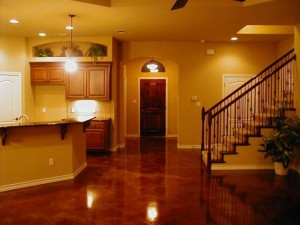Our potential clients often ask us the differences between stamped overlays and troweled overlays There are significant differences that every homeowner should be aware of before making a decision about their concrete coating project.
Stamped concrete is concrete that is patterned and/or textured or embossed to resemble brick, slate, flagstone, stone, tile, wood, and various other patterns and textures. Stamped concrete is commonly used for patios, sidewalks, driveways, pool decks, and interior flooring. The ability of stamped concrete to resemble other building materials makes stamped concrete a less expensive alternative to using those other authentic materials such as stone, slate or brick. 
 There are three procedures used in stamped concrete which separate it from other concrete procedures; the addition of a base color, the addition of an accent color, and stamping a pattern into the concrete. These three procedures provide stamped concrete with a color and shape similar to the natural building material. It also is longer lasting than paved stone, and still resembles the look. One Drawback to Stamped Concrete as compared to Troweled on Systems, it is more expensive to do just because it requires more material to be placed and can be mo re time consuming as well. So basically more material and labor are required.
There are three procedures used in stamped concrete which separate it from other concrete procedures; the addition of a base color, the addition of an accent color, and stamping a pattern into the concrete. These three procedures provide stamped concrete with a color and shape similar to the natural building material. It also is longer lasting than paved stone, and still resembles the look. One Drawback to Stamped Concrete as compared to Troweled on Systems, it is more expensive to do just because it requires more material to be placed and can be mo re time consuming as well. So basically more material and labor are required.

 A troweled coating is applied by troweling a cement mixture onto the top of existing concrete, usually at a thickness of approximately 1/8”. The coloring on a troweled coating is put within the concrete while it’s being mixed. The grout lines are taped to resemble brick, slate, flagstone, stone, tile, then a tack coat is added over the tape to prevent bleeding of the colors (basically sealing in the grout coat so the top coat will not bleed into the grout lines. The Top coat is then applied in a rough texture to resemble rock or a smother texture to possibly to be more like Tile, or an knockdown finish may be desired, usually two to three coats of sealer is applied to Finish the Project.
A troweled coating is applied by troweling a cement mixture onto the top of existing concrete, usually at a thickness of approximately 1/8”. The coloring on a troweled coating is put within the concrete while it’s being mixed. The grout lines are taped to resemble brick, slate, flagstone, stone, tile, then a tack coat is added over the tape to prevent bleeding of the colors (basically sealing in the grout coat so the top coat will not bleed into the grout lines. The Top coat is then applied in a rough texture to resemble rock or a smother texture to possibly to be more like Tile, or an knockdown finish may be desired, usually two to three coats of sealer is applied to Finish the Project.
For More information, questions or comments, please contact me here or visit my other website located here…
You can also become a Fan on Facebook ==>>
Follow us on Twitter ==>>
Watch our Video’s on Youtube ==>>
 Understanding the solutions that our products provide can be somewhat confusing because quiet frankly, there are just too many options and solutions. With that said, we will start by breaking down the solutions into two categories; Exterior and Interior…
Understanding the solutions that our products provide can be somewhat confusing because quiet frankly, there are just too many options and solutions. With that said, we will start by breaking down the solutions into two categories; Exterior and Interior…





